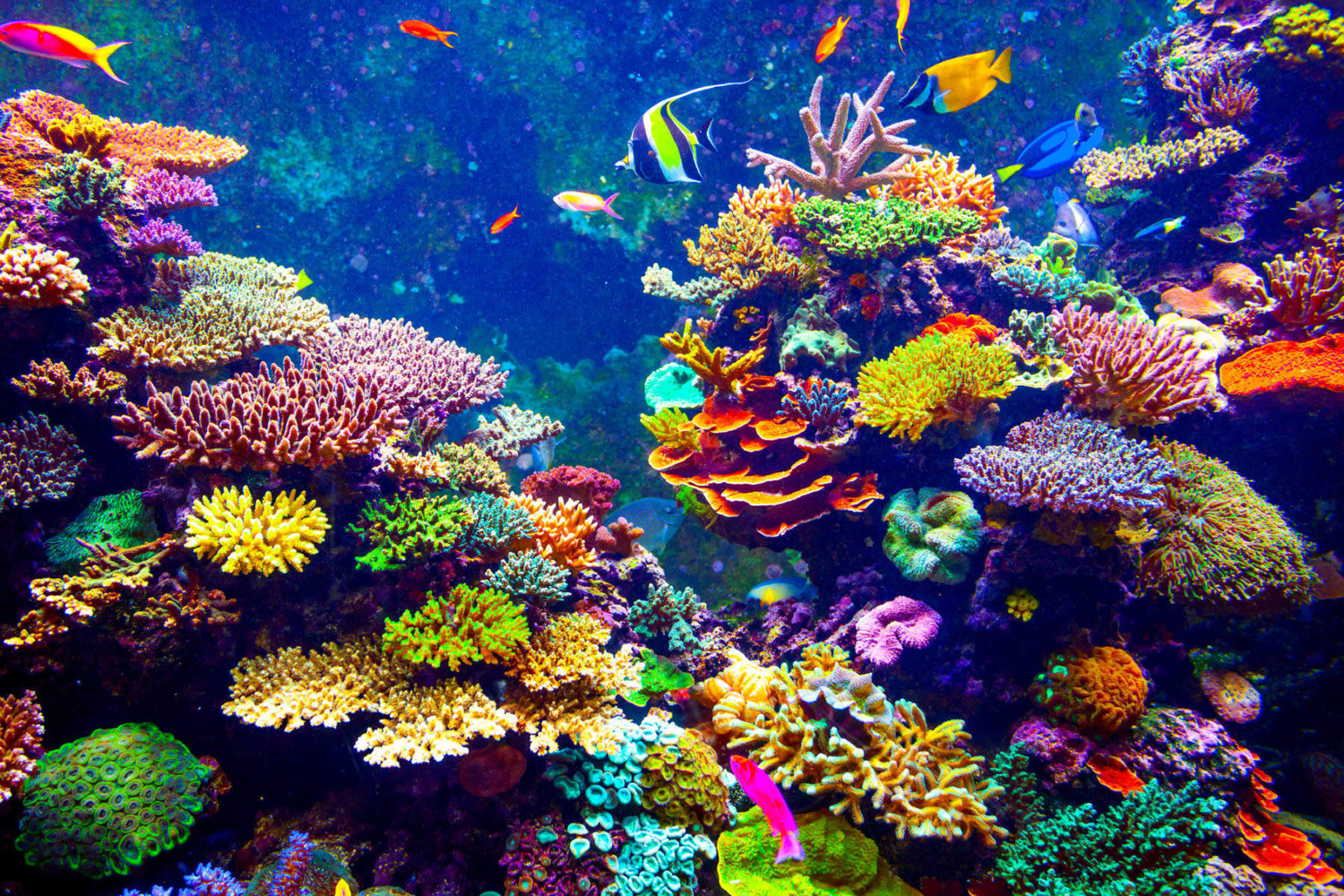Ocean conservation is an extremely important topic due to the vital role that the oceans play on our planet. They provide habitat for a wide variety of marine life, regulate the global climate, absorb carbon dioxide and produce a large part of the oxygen we breathe. However, the oceans are facing a number of threats and challenges that affect their health and resilience.
Pollution is one of the main concerns for the conservation of the oceans. The oceans receive large amounts of pollutants from human activities such as sewage discharge, oil spills, agriculture and industrial pollution. These pollutants can have devastating effects on marine life, causing massive deaths of fish and other animals, as well as the destruction of coastal ecosystems such as coral reefs.
Overfishing is another significant threat to the oceans. The global demand for seafood has led to unsustainable fishing practices, including illegal fishing, trawl fishing that destroys the seabed, and the capture of endangered species. This results in declining fish populations and disrupting marine ecosystems.
Climate change also negatively affects the oceans. Rising ocean temperatures cause coral reefs to bleach, leading to the large-scale death of these biodiversity-rich ecosystems. In addition, climate change leads to ocean acidification due to the absorption of carbon dioxide, which harms sensitive marine organisms such as molluscs and corals and affects the entire food chain.
To combat these threats and promote ocean conservation, it is necessary to adopt protective measures and policies. Some strategies include creating marine protected areas where fishing is regulated and destructive activities are prohibited – establishing stricter laws to prevent ocean pollution and developing sustainable fishing practices such as fishing with quotas and using of selective networks.
In addition, it is essential to raise awareness and educate the public about the importance of the oceans and their current state. Environmental education can help promote behavioral changes and encourage the adoption of more sustainable practices in relation to the use of marine resources.
Ocean conservation is crucial to preserving marine biodiversity, ensuring the health of coastal ecosystems and protecting our own future. Through the implementation of protective measures, regulation and awareness, we can help preserve the oceans and ensure that they continue to play their vital role in the balance of our planet.
On World Oceans Day, celebrated on 8 June, UN Secretary-General António Guterres shares a message of celebration and hope. He highlights the historic High Seas Treaty, adopted on March 4, 2023, as an important achievement for the protection of the oceans. This treaty aims to preserve 30% in the world's oceans, ensuring their sustainability and conservation.
In addition, Guterres highlights progress in international negotiations for a global and legally binding agreement to end plastic pollution. This agreement, which is in the process of being discussed, has the potential to come into force as early as 2024, demonstrating a global commitment to address this serious environmental problem.
World Oceans Day has been celebrated since 1992, when the Earth Summit took place in Rio de Janeiro. This conference, organized by the United Nations (UN), aimed to discuss environmental issues and sustainable development. Since then, the date has become a time for awareness and action to protect the oceans, which play a vital role on our planet. Therefore, the UN signals the impacts of overexploitation and ocean acidification, in which 1/3 of fish stocks are currently fished at unsustainable levels. It points out that, every year, from 19 to 23 million plastics are dumped into aquatic ecosystems, harming more than 800 species – in addition to humans.
High Seas Treaty: Towards the Global Protection of the Oceans
As we celebrate World Oceans Day, it is imperative to recognize the critical importance of our blue treasures and the urgent need to preserve them. The oceans are a source of life, offering a multitude of benefits for our planet and for every human being that inhabits it.
However, we face ever-increasing challenges that threaten the health and resilience of the oceans. Pollution, overfishing, climate change and other human impacts have led to the degradation of marine ecosystems and loss of biodiversity. As a result, the oceans are in a state of crisis, requiring immediate and coordinated action.
Fortunately, there are reasons for optimism. The High Seas Treaty, a historic agreement aimed at the conservation and sustainable use of marine biodiversity beyond national jurisdictions, is moving towards ratification. This treaty could become a significant milestone in protecting the oceans, providing a comprehensive legal framework for the governance of marine resources.
In addition, awareness and global mobilization in favor of ocean conservation is growing. Non-governmental organizations, governments, scientists and citizens around the world are joining forces to promote marine sustainability and implement responsible ocean practices.
However, the task before us is immense. It is necessary to ensure the effective implementation of the High Seas Treaty, as well as to strengthen existing efforts to conserve and protect the oceans. This involves adopting stricter policies and regulations, establishing marine protected areas, promoting sustainable fisheries and reducing pollution.
Awareness and education are key. It is necessary that each individual understands the importance of the oceans and the impact of their daily actions on them. Changing behavior towards the use of single-use plastics, promoting sustainable food choices and reducing the carbon footprint are some of the actions we can all take to contribute to the preservation of the oceans.
On this World Oceans Day, it is necessary to renew commitments to the conservation of these precious ecosystems.
According to the United Nations, more than 3 million people depend on marine and coastal biodiversity for their livelihoods. At the biodiversity summit in Montreal, States reaffirmed their commitment to protect 30% from the world's lands and seas by 2030. With the implementation of the new legal mechanism provided for by the High Seas Treaty, nations will have the opportunity to participate in the evaluation and approval of activities in the oceans. In addition, the document allows scientific projects to be carried out, promoting a better understanding of marine ecosystems and their functioning.
These advances represent an important response to address unregulated activities and protect biodiversity in the oceans. Through the establishment of marine protected areas and the involvement of nations in decisions related to ocean activities, it is hoped to promote the conservation and sustainable use of marine resources, ensuring the preservation of marine ecosystems for present and future generations.
Historic Agreement: UN Establishes Protection of Marine Biodiversity in International Waters
A historic agreement was reached by the UN to establish the protection of marine biodiversity in international waters. This achievement represents a significant milestone in ocean conservation, taking into account the importance of marine ecosystems to the health of the planet and human well-being. With this agreement, the international community recognizes the urgent need to regulate activities such as fishing, mining and navigation in waters beyond national jurisdictions, in order to preserve the rich biodiversity that exists in the oceans. This initiative has the potential to guarantee a sustainable future for marine resources and for future generations, promoting the conservation of ecosystems and the preservation of marine treasures that play a vital role for life on Earth.
The UN underscores the importance of the established guidelines as an essential means of achieving the ocean-related goals of the 2030 Agenda for Sustainable Development and the Kunming-Montreal Global Biodiversity Framework. The “30×30” commitment was reached at the UN Conference in Montreal, with the aim of protecting one-third of the world's biodiversity, both on land and in the sea, by 2030. The decision of the Bbnj agreement is based on the legacy of the Convention of United Nations on the Law of the Sea, and the UN Secretary-General commended all parties involved for their ambition, flexibility and perseverance. The consensus reached on a global legal framework for the high seas is considered a huge success for multilateralism, according to the President of the General Assembly. This achievement is seen as an example of the necessary transformation required by the world and by people.
Protecting marine biodiversity in international waters is vital to preserving marine ecosystems, ensuring resource sustainability and promoting ocean health. This achievement underscores the importance of collaboration between countries and involving all stakeholders in the pursuit of a sustainable future. In the context of the global environmental crisis, the agreement represents a significant step in the transformation needed to address environmental challenges and protect marine biodiversity. It's a call to action to preserve our planet's blue treasures and ensure a sustainable legacy for future generations.
Political and Technological Advances Could Reduce Plastic Pollution by 80%, UN Says
UN says that, by calculations, it is possible to reduce pollution by up to 80% by 2040 if countries adopt measures, using technologies already available. A new report from the United Nations Environment Program highlights that it is possible to significantly reduce plastic pollution in the oceans through coordinated actions between the public and private sectors. Entitled “Turning the Tap: How the World Can End Plastic Pollution and Create a Circular Economy,” the report proposes three shifts in market behavior: reuse, recycling, repurposing and product diversification.
The United Nations Environment Program proposal underscores that the cost of inaction on plastic pollution can far outweigh efforts to address the problem. In addition, the proposed measures could create approximately 700 million new jobs.
The report was released ahead of the second round of talks in Paris aimed at a global deal to tackle plastic pollution. This initiative seeks to encourage international cooperation in the search for effective solutions and promote a circular economy that minimizes the negative impact of plastic waste on marine and terrestrial ecosystems.
In summary, the report highlights the feasibility of reducing plastic pollution in the oceans through appropriate policy and behavior changes, while highlighting the economic and environmental benefits that can be achieved from such measures.
According to the United Nations Environment Program (UNEP), world plastic production reaches the mark of 430 million tons per year, with only 9% being recycled. If the current pace persists, it is estimated that plastic production will triple by 2060.
In 2021, the world is estimated to have produced 139 million metric tons of single-use plastic waste. However, it should be noted that the implementation of new habits and practices in the plastics chain could generate up to 700,000 jobs for informal workers.
The implementation of internationally agreed public policies plays a crucial role in overcoming the limits of national planning and business action regarding plastic pollution. These policies have the potential to sustain a global circular plastics economy, creating business opportunities and jobs.
By working together, governments can establish guidelines and regulations that encourage the reuse, recycling and diversification of plastic products. These policies promote the transition to a circular economy, in which plastic materials are kept in production cycles longer, thus minimizing waste and pollution.
In addition, international cooperation and shared policies can enable the development of advanced recycling and plastic waste management technologies. Not only does this reduce plastic pollution, it also creates opportunities for innovation and economic growth.
Implementing global public policies can also drive consumer awareness and behavior change. By educating people about the negative impacts of plastic pollution and providing sustainable alternatives, it is possible to promote more responsible choices and reduce the excessive consumption of single-use plastics.
Therefore, international cooperation through globally agreed public policies can play a key role in overcoming plastic pollution challenges. These policies have the potential to create a circular plastics economy, drive business and job opportunities, and promote long-term environmental sustainability.
Foundations of Life: The Vital Importance of the Oceans to the Planet
While progress has been made with the UN convention on protecting high seas biodiversity and negotiations to combat marine litter, the health of the oceans continues to deteriorate rapidly. The climate crisis, overfishing and destruction of coastal ecosystems are having negative impacts, especially for coastal communities in the Global South, who are directly dependent on marine resources. Competition for ocean space and resources is increasing, making conflict resolution between different stakeholders crucial to ensure sustainable use and effective conservation of the oceans. In this context, a global maritime strategy must transparently and participatively integrate the environment, development and the people involved, in order to achieve positive long-term results.
Oceans play a vital role in sustaining life on our planet. They are not just vast expanses of water, but the very foundations of life on Earth. These immense bodies of water not only provide the air we breathe and the food we consume, but they also play a crucial role in regulating climate and weather. Furthermore, the oceans are home to an unparalleled wealth of biodiversity. They are the largest reservoir of species and ecosystems on our planet, home to a community of life forms, from sea creatures to majestic whales and colorful coral reefs.
This marine biodiversity not only delights and fascinates, but also plays a key role in maintaining the health of ocean ecosystems and the health of the planet itself. The oceans' resources also sustain human communities around the world. From fisheries that provide food and livelihoods for millions of people, to coastal tourism that drives the economy of many regions, the oceans are a source of human well-being and oversight.
Furthermore, marine resources have also been exploited for medical and scientific purposes, with hope for important advances in human health and scientific knowledge. The protection and preservation of the oceans are urgent issues of global importance. In this era of awareness of the importance of sustainability, it is critical to recognize that the oceans play a crucial role in our very existence and well-being.
The preservation and sustainable use of ocean resources not only ensure the survival of marine species, but also protect our own health and safety. Therefore, it is everyone's responsibility to take action to protect, preserve and care for the precious oceans, ensuring that they continue to be the foundation of life on our planet.
Overexploitation of marine resources, such as overfishing and deep sea mining, has negatively impacted biodiversity and ocean ecosystems. Pollution, including pollution from plastics, chemicals and runoff from agricultural nutrients, has also caused serious damage to the oceans.
Furthermore, climate change has affected the oceans in a variety of ways, including rising water temperatures, ocean acidification and rising sea levels. These phenomena have devastating consequences for marine ecosystems, leading to habitat loss, coral bleaching and species displacement.
In the face of these challenges, it is crucial that humanity changes its approach to the oceans, taking steps to conserve and protect these vital ecosystems. This includes implementing sustainable fisheries management policies, reducing marine pollution, establishing marine protected areas and transitioning to a circular economy that minimizes the production of plastic waste.
It is imperative to promote awareness and education about the importance of the oceans, encouraging responsible consumption practices and the adoption of sustainable lifestyles. International cooperation is also critical, as the challenges faced by the oceans require joint and coordinated efforts by all countries.
Becoming the best friend of the oceans means acknowledging our responsibility to protect them and acting accordingly. Only then will it be guaranteed that the oceans will continue to play their vital role in sustaining life on Earth, providing resources, regulating the climate and harboring a rich diversity of species.




